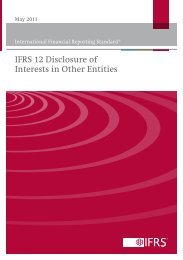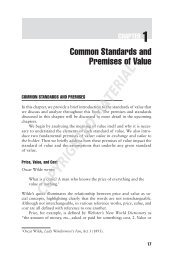ISSUE 5 2008 - Sweet & Maxwell
ISSUE 5 2008 - Sweet & Maxwell
ISSUE 5 2008 - Sweet & Maxwell
Create successful ePaper yourself
Turn your PDF publications into a flip-book with our unique Google optimized e-Paper software.
Crim. L.R. Public Nuisance Injunctions Against On-Street 369<br />
sex work. Local authorities can still use their powers under s.222 of the Local<br />
Government Act 1972 to stop the individual from committing a particular offence<br />
where criminal proceedings proved inadequate to bring the problem to an end.<br />
However, the crime targeted could not be one of public nuisance if the crime<br />
did not exist, nor could an injunction be used to stop a non-existent offence.<br />
Accordingly, local authorities would have to revert to using the many statutory laws<br />
which are more defined, for which a criminal standard of proof is required, and to<br />
which the stick to beat the offender has been adjudged appropriate by Parliament.<br />
Without doubt civil remedies can offer a range of advantages that the criminal law<br />
cannot match in either scope or flexibility. It is not surprising therefore that there<br />
is no indication to date that local authorities will refrain from using, or threatening<br />
to use the PNI against sex workers. 118 By utilising the civil law, punishments can<br />
be meted out to offenders while bypassing the criminal law’s cumbersome and<br />
time-consuming constraints. Yet, of course, the criminal law’s cumbersomeness<br />
and time constraints are there to serve a purpose. As Ashworth contends, human<br />
rights have little significance where they are ‘‘simply ... ‘weighed’ against the<br />
public interest and then discarded, and also because it implies that the defendants<br />
are ‘outside’ the community’’. 119 However, the rights of the community have always<br />
‘‘trumped’’ the rights of the sex worker—the outsider. Nevertheless, arguably, as<br />
long as it is the visibility of sex workers that is at issue for local authorities rather<br />
than sex worker welfare, on-street sex work will continue in the Ladywood area<br />
of Birmingham—an area that in the run up to the issuing of the PNIs against sex<br />
workers appeared on the list of the top 10 poorest parliamentary constituencies. 120<br />
Strategies of zero tolerance may oust sex workers from a targeted area for a time but<br />
they do not provide a long-term solution. 121 More often than not, as the breaches<br />
of a quarter of the injunctions issued against sex workers in Ladywood and the<br />
breaches of ASBOs in that same area indicate, 122 such strategies stand to return<br />
sex workers to the clutches of the criminal justice system.<br />
118 There is no wording to this effect either on Birmingham City Council’s website or<br />
indeed the many Home Office/Government sites such as Respect, http://www.respect.gov.uk<br />
[Accessed February 20, <strong>2008</strong>]. In fact, the very opposite is true, the use of PNIs to tackle<br />
street sex work is very much encouraged.<br />
119 Ashworth, ‘‘Social Control and ‘Anti-Social Behaviour’’’ (2004) 120 L.Q.R. 263 at<br />
290–291.<br />
120 ‘‘Report Reveals Britain’s 10 Most Poor Areas’’, Society Guardian, February 18, 2002,<br />
http://www.guardian.co.uk/society/2002/feb/18/socialexclusion [Accessed February 19, <strong>2008</strong>].<br />
121 The work of Street Watch in Balsall Heath was held up as a success, see M.<br />
Lean, ‘‘The Red Lights go Green in Birmingham’’’ (1996) For a Change Magazine,<br />
http://www.forachange.net/browse/1504.html [Accessed March 5, <strong>2008</strong>]. However, as already<br />
noted, the actions of Street Watch led to the displacement of sex workers into<br />
Edgbaston/Ladywood, Sanders, ‘‘The Risks of Street Prostitution’’ (2004) 41 Urban Studies<br />
1703. Several years later the deployment of ASBOs in the Ladywood area were thought to<br />
be ‘‘the’’ effective deterrent; see Orr-Munro, ‘‘Curbing Street Sex’’, Police Review, July 28,<br />
2002, but still, the City Council had to issue PNIs little more than a year later.<br />
122 With regard to PNIs see Birmingham City Council, Legal Services Briefing Note,<br />
(2004), para.4.12; Jones and Sagar, ‘‘Crime and Disorder Act 1998’’ [2001] Crim. L.R. 873,<br />
which highlighted breaches of ASBOs by sex workers in Birmingham.<br />
© SWEET &MAXWELL






